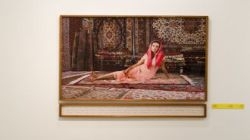
Tal Shochat / Forugh Farrokhzad
Tal Shochat
Born in Hadera, 1974
Lives and works in Tel Aviv
Tal Shochat presents photographs created in the format of Persian miniatures - images accompanied by texts. The texts, which are excerpted from poems by Forugh Farrokhzad and by the Iranian poet Sohrab Sepehri (1928-1980), are accompanied by photographs of women: Deborah lying on a bench in an Ein Kerem church; Nawrose sitting in a Persian carpet store in the Jaffa flea market (such carpets are themselves texts that can be interpreted by connoisseurs); and Rumia standing in a wash basin against a background of Armenian tiles. The fourth photograph features Tal Shochat's mother as a cleaning woman in a synagogue. Shochat's mother immigrated to Israel from Libya, while her father came from Iran. They both appear regularly in her photographs, alongside various Mizrachi models. The world of Middle-Eastern and North-African Jews - with its familiar figures, high visibility, colors, cultural tropes, and Orientalist stereotypes - is present in most of Shochat's photographs. Her artistic strategy shapes a vision of the Orient that is at once old and new in the context of Israeli art.
Forugh Farrokhzad
1935 - 1967, Tehran, Iran
Forugh Farrokhzad was one of the greatest Iranian poets of the modern era. Her poems, which are concerned with love and sexuality, were banned in her homeland. Yet these same themes made Farrokhzad's short and stormy life, together with her poetry, into a subject of great admiration among those members of Iranian society who value individual liberty. Her death at age 32 in a car accident contributed to the aura surrounding Farrokhzad and to the image of a liberated, feminist artist. Her book of poems Another Birth was published in 1963.